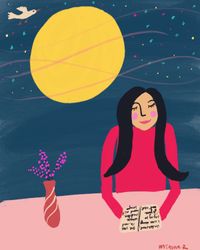"You have to be alone in order to appreciate the other person's presence."
In the end stage of terminal cancer that would claim his life, neurologist Oliver Sacks sat in deep gratitude for his life and everyone in it. His last essays, published separately but bundled under the title Gratitude, became an elegant anchoring point for my - and many others' - understanding of this significant word gratitude.
I am grateful that I have experienced many things - some wonderful, some horrible-and that I have been able to write a dozen books, to receive innumerable letters from friends, colleagues, and readers, and to enjoy what Nathanial Hawthorne called " an intercourse with the world."
FROM Oliver Sacks' essay "MERCURY," written JULY 2013
Sack's life's work was to understand and thus give personhood to individuals with neurological conditions and injuries. And yet, in this particular reflective moment, although connected to others through memory, he was very much alone. We see his enduring spirit: "I'm not done living," Sacks shouts from the page. Reflection, love, and even joy abound in what he calls gratitude.
It reminds me of a similar narrative from humanist/scientist Alan Lightman, who felt grateful for life while lying alone surrounded by stars. "I felt an overwhelming connection to the stars as if I were part of them," Lightman wrote in his sublime guide to the limits of self-knowledge. While Sacks reminisced on the people he'd known, Lightman contemplated every atomic structure.
They lifted their hearts in solitude and generously expanded feelings into the world. Is that gratitude?
 "Reading Mary Oliver by Moonlight” by Natasha Rauf.
"Reading Mary Oliver by Moonlight” by Natasha Rauf.Buddhist monk Thích Nhất Hạnh (October 11, 1926 – January 22, 2022) certainly thinks so and has written numerous beautiful books on the power of solitary meditation as a connective force. In his study of anger (and how to embrace/extinguish it), he explores the symbiosis of solitude and gratitude.
You have to be alone in order to fully appreciate the other person's presence. If you are always together, you may take him for granted, forgetting to enjoy his beauty and goodness. Every now and then, take three or seven days off. Take time away from him in order to be able to appreciate him more. Although you are far away from him, he is more real to you, more substantial than when you are constantly together. During the time you are apart, you will remember how important, and precious he is to you.
Is there a connection between feeling gratitude during a separation from others? Rilke advised us: "Go into yourself," suspecting that our most profound doubts would be met and assuaged in that self-echoing space.
Nhất Hạnh continues:
There are moments when we feel very grateful for the other person in our life. We deeply appreciate his or her presence. We are full of compassion, gratitude, and love. We have experienced moments like this in our life. We feel so grateful that the other person is still alive, that she is still with us, and has stood by our side during very difficult times. I would suggest that if such a moment happens again, take advantage of it.
 "I run to acquire a void," wrote Haruki Murakami in his meditation on solitude and running. Photograph by Ellen Vrana.
"I run to acquire a void," wrote Haruki Murakami in his meditation on solitude and running. Photograph by Ellen Vrana.We need space to let love into our hearts. As always, Nhất Hạnh's writing is full of gentle, loving encouragement on how to do this.
You can love. You do have the capacity to appreciate another person, to feel grateful. This is a blessing. You know you are lucky to have met your partner, you are lucky to have your beloved one in your life. Why do you let your truth fly away? It is in your heart. Every time you touch the love and appreciation in you, you feel grateful again.
To make the most of such a feeling, to hold it and expand it simultaneously, Nhất Hạnh suggests we retreat deep into our solitude and use its stillness.
To truly profit from this time, withdraw to a place where you can be alone with yourself. Don't just go to the other person and say "I am grateful you are there." That is not enough You can do this later. Right at that moment it is better to withdraw into your room or a quiet place and immerse yourself in that feeling of gratitude. Then write down your gratitude and your happiness.
Thích Nhất Hạnh's Anger is a composition of life-fashioned wisdom on how to receive and hold love for one another. If you seek to set yourself apart in gratitude - towards others or even towards yourself - take along these devotional letters from Roald Dahl to his mother, Joy Davidman's inspired poetry to her beloved - and distant - C. S. Lewis, and Virginia Woolf's passionate essay on the need for solitary space to create art.

